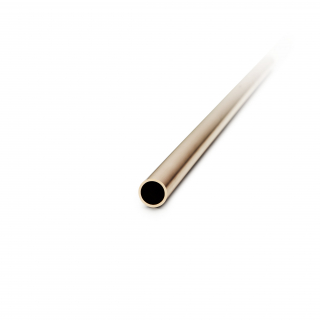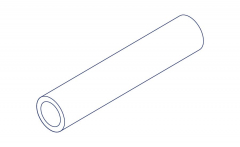CW024A
Rundrohr - in Stangen

- Form Rundrohr - in Stangen
- Material Kupfer
- Werkstoff CW024A
- Werkstoff chemisch EN 573-3 Cu-DHP


Unternehmen der BIKAR Metals



Leitungen für technische und medizinische Gase
Kondensatoren und Wärmeaustauscher
Rippenrohre für Motorkühler
Kälte-und Klimaanlagen
Leitungen und Teile für die Nahrungsmittel-, Getränke- und Papierindustrie
Teile für die chemische Industrie
Rohre für alle nicht korrosiven Flüssigkeiten
Außen- bzw. lnnenverkleidung und Abdichtungen im Bauwesen
Elektrische und elektromagnetische Abschirmungen
Anoden für Elektroplattieren und Galvanoplastik
Druckbehälter
Speicheranlagen und Zylinder
Druckwalzen
Plattierte Bleche
| P (von) | 0,015 |
| P (bis) | 0,04 |
| Rest | Cu |
| geeignet nach DIN EN 602 | Nein |
| Luftfahrt | Nein |
| Hartlöten | 1 |
| Weichlöten | 1 |
| Wärmeausdehnungskoeffizient von 20 bis 100°C | 16,8 K⁻¹10⁻⁶ |
| Wärmeausdehnungskoeffizient von 20 bis 200°C | 17,3 K⁻¹10⁻⁶ |
| Wärmeausdehnungskoeffizient von 20 bis 300°C | 17,7 K⁻¹10⁻⁶ |
| Dichte | 8,94 g/cm³ |
| Elastizitätsmodul bei 100°C | 128 GPa |
| Elastizitätsmodul bei 20°C | 132 GPa |
| Elastizitätsmodul bei 200°C | 122 GPa |
| Elastizitätsmodul bei 300°C | 118 GPa |
| Spezifische elektrische Leitfähigkeit bei 100°C | 37 m/Ω*mm² |
| Spezifische elektrische Leitfähigkeit bei 20°C | 43 m/Ω*mm² |
| Spezifische elektrische Leitfähigkeit bei 200°C | 30 m/Ω*mm² |
| Spezifischer elektrischer Widerstand bei 100°C | 0,027 Ω*mm²/m |
| Spezifischer elektrischer Widerstand bei 20°C | 0,022 Ω*mm²/m |
| Spezifischer elektrischer Widerstand bei 200°C | 0,033 Ω*mm²/m |
| Spezifische Wärme bei 100°C | 0,393 J/(kg·K) |
| Spezifische Wärme bei 20°C | 0,386 J/(kg·K) |
| Spezifische Wärme bei 200°C | 0,403 J/(kg·K) |
| Wärmeleitfähigkeit bei 100°C | 318 W/m*K |
| Wärmeleitfähigkeit bei 20°C | 305 W/m*K |
| Wärmeleitfähigkeit bei 200°C | 334 W/m*K |
| Gas | 1 |
| MIG | 1 |
| Widerstandspunktschweißen | 3 |
| WIG | 1 |
| Werkstoff chemisch EN 573-3 | Cu-DHP |
| Werkstoff Nr. | CW024A (former: 2.0090) |
| P (von) | 0,015 |
| P (bis) | 0,04 |
| Rest | Cu |
| geeignet nach DIN EN 602 | Nein |
| Luftfahrt | Nein |
| Hartlöten | 1 |
| Weichlöten | 1 |
| Wärmeausdehnungskoeffizient von 20 bis 100°C | 16,8 K⁻¹10⁻⁶ |
| Wärmeausdehnungskoeffizient von 20 bis 200°C | 17,3 K⁻¹10⁻⁶ |
| Wärmeausdehnungskoeffizient von 20 bis 300°C | 17,7 K⁻¹10⁻⁶ |
| Dichte | 8,94 g/cm³ |
| Elastizitätsmodul bei 100°C | 128 GPa |
| Elastizitätsmodul bei 20°C | 132 GPa |
| Elastizitätsmodul bei 200°C | 122 GPa |
| Elastizitätsmodul bei 300°C | 118 GPa |
| Spezifische elektrische Leitfähigkeit bei 100°C | 37 m/Ω*mm² |
| Spezifische elektrische Leitfähigkeit bei 20°C | 43 m/Ω*mm² |
| Spezifische elektrische Leitfähigkeit bei 200°C | 30 m/Ω*mm² |
| Spezifischer elektrischer Widerstand bei 100°C | 0,027 Ω*mm²/m |
| Spezifischer elektrischer Widerstand bei 20°C | 0,022 Ω*mm²/m |
| Spezifischer elektrischer Widerstand bei 200°C | 0,033 Ω*mm²/m |
| Spezifische Wärme bei 100°C | 0,393 J/(kg·K) |
| Spezifische Wärme bei 20°C | 0,386 J/(kg·K) |
| Spezifische Wärme bei 200°C | 0,403 J/(kg·K) |
| Wärmeleitfähigkeit bei 100°C | 318 W/m*K |
| Wärmeleitfähigkeit bei 20°C | 305 W/m*K |
| Wärmeleitfähigkeit bei 200°C | 334 W/m*K |
| Gas | 1 |
| MIG | 1 |
| Widerstandspunktschweißen | 3 |
| WIG | 1 |
| Werkstoff chemisch EN 573-3 | Cu-DHP |
| Werkstoff Nr. | CW024A (former: 2.0090) |
| P (von) | 0,015 |
| P (bis) | 0,04 |
| Rest | Cu |
| geeignet nach DIN EN 602 | Nein |
| Luftfahrt | Nein |
| Hartlöten | 1 |
| Weichlöten | 1 |
| Wärmeausdehnungskoeffizient von 20 bis 100°C | 16,8 K⁻¹10⁻⁶ |
| Wärmeausdehnungskoeffizient von 20 bis 200°C | 17,3 K⁻¹10⁻⁶ |
| Wärmeausdehnungskoeffizient von 20 bis 300°C | 17,7 K⁻¹10⁻⁶ |
| Dichte | 8,94 g/cm³ |
| Elastizitätsmodul bei 100°C | 128 GPa |
| Elastizitätsmodul bei 20°C | 132 GPa |
| Elastizitätsmodul bei 200°C | 122 GPa |
| Elastizitätsmodul bei 300°C | 118 GPa |
| Spezifische elektrische Leitfähigkeit bei 100°C | 37 m/Ω*mm² |
| Spezifische elektrische Leitfähigkeit bei 20°C | 43 m/Ω*mm² |
| Spezifische elektrische Leitfähigkeit bei 200°C | 30 m/Ω*mm² |
| Spezifischer elektrischer Widerstand bei 100°C | 0,027 Ω*mm²/m |
| Spezifischer elektrischer Widerstand bei 20°C | 0,022 Ω*mm²/m |
| Spezifischer elektrischer Widerstand bei 200°C | 0,033 Ω*mm²/m |
| Spezifische Wärme bei 100°C | 0,393 J/(kg·K) |
| Spezifische Wärme bei 20°C | 0,386 J/(kg·K) |
| Spezifische Wärme bei 200°C | 0,403 J/(kg·K) |
| Wärmeleitfähigkeit bei 100°C | 318 W/m*K |
| Wärmeleitfähigkeit bei 20°C | 305 W/m*K |
| Wärmeleitfähigkeit bei 200°C | 334 W/m*K |
| Gas | 1 |
| MIG | 1 |
| Widerstandspunktschweißen | 3 |
| WIG | 1 |
| Werkstoff chemisch EN 573-3 | Cu-DHP |
| Werkstoff Nr. | CW024A (former: 2.0090) |
| P (von) | 0,015 |
| P (bis) | 0,04 |
| Rest | Cu |
| geeignet nach DIN EN 602 | Nein |
| Luftfahrt | Nein |
| Hartlöten | 1 |
| Weichlöten | 1 |
| Wärmeausdehnungskoeffizient von 20 bis 100°C | 16,8 K⁻¹10⁻⁶ |
| Wärmeausdehnungskoeffizient von 20 bis 200°C | 17,3 K⁻¹10⁻⁶ |
| Wärmeausdehnungskoeffizient von 20 bis 300°C | 17,7 K⁻¹10⁻⁶ |
| Dichte | 8,94 g/cm³ |
| Elastizitätsmodul bei 100°C | 128 GPa |
| Elastizitätsmodul bei 20°C | 132 GPa |
| Elastizitätsmodul bei 200°C | 122 GPa |
| Elastizitätsmodul bei 300°C | 118 GPa |
| Spezifische elektrische Leitfähigkeit bei 100°C | 37 m/Ω*mm² |
| Spezifische elektrische Leitfähigkeit bei 20°C | 43 m/Ω*mm² |
| Spezifische elektrische Leitfähigkeit bei 200°C | 30 m/Ω*mm² |
| Spezifischer elektrischer Widerstand bei 100°C | 0,027 Ω*mm²/m |
| Spezifischer elektrischer Widerstand bei 20°C | 0,022 Ω*mm²/m |
| Spezifischer elektrischer Widerstand bei 200°C | 0,033 Ω*mm²/m |
| Spezifische Wärme bei 100°C | 0,393 J/(kg·K) |
| Spezifische Wärme bei 20°C | 0,386 J/(kg·K) |
| Spezifische Wärme bei 200°C | 0,403 J/(kg·K) |
| Wärmeleitfähigkeit bei 100°C | 318 W/m*K |
| Wärmeleitfähigkeit bei 20°C | 305 W/m*K |
| Wärmeleitfähigkeit bei 200°C | 334 W/m*K |
| Gas | 1 |
| MIG | 1 |
| Widerstandspunktschweißen | 3 |
| WIG | 1 |
| Werkstoff chemisch EN 573-3 | Cu-DHP |
| Werkstoff Nr. | CW024A (former: 2.0090) |
| P (von) | 0,015 |
| P (bis) | 0,04 |
| Rest | Cu |
| geeignet nach DIN EN 602 | Nein |
| Luftfahrt | Nein |
| Hartlöten | 1 |
| Weichlöten | 1 |
| Wärmeausdehnungskoeffizient von 20 bis 100°C | 16,8 K⁻¹10⁻⁶ |
| Wärmeausdehnungskoeffizient von 20 bis 200°C | 17,3 K⁻¹10⁻⁶ |
| Wärmeausdehnungskoeffizient von 20 bis 300°C | 17,7 K⁻¹10⁻⁶ |
| Dichte | 8,94 g/cm³ |
| Elastizitätsmodul bei 100°C | 128 GPa |
| Elastizitätsmodul bei 20°C | 132 GPa |
| Elastizitätsmodul bei 200°C | 122 GPa |
| Elastizitätsmodul bei 300°C | 118 GPa |
| Spezifische elektrische Leitfähigkeit bei 100°C | 37 m/Ω*mm² |
| Spezifische elektrische Leitfähigkeit bei 20°C | 43 m/Ω*mm² |
| Spezifische elektrische Leitfähigkeit bei 200°C | 30 m/Ω*mm² |
| Spezifischer elektrischer Widerstand bei 100°C | 0,027 Ω*mm²/m |
| Spezifischer elektrischer Widerstand bei 20°C | 0,022 Ω*mm²/m |
| Spezifischer elektrischer Widerstand bei 200°C | 0,033 Ω*mm²/m |
| Spezifische Wärme bei 100°C | 0,393 J/(kg·K) |
| Spezifische Wärme bei 20°C | 0,386 J/(kg·K) |
| Spezifische Wärme bei 200°C | 0,403 J/(kg·K) |
| Wärmeleitfähigkeit bei 100°C | 318 W/m*K |
| Wärmeleitfähigkeit bei 20°C | 305 W/m*K |
| Wärmeleitfähigkeit bei 200°C | 334 W/m*K |
| Gas | 1 |
| MIG | 1 |
| Widerstandspunktschweißen | 3 |
| WIG | 1 |
| Werkstoff chemisch EN 573-3 | Cu-DHP |
| Werkstoff Nr. | CW024A (former: 2.0090) |
| P (von) | 0,015 |
| P (bis) | 0,04 |
| Rest | Cu |
| geeignet nach DIN EN 602 | Nein |
| Luftfahrt | Nein |
| Hartlöten | 1 |
| Weichlöten | 1 |
| Wärmeausdehnungskoeffizient von 20 bis 100°C | 16,8 K⁻¹10⁻⁶ |
| Wärmeausdehnungskoeffizient von 20 bis 200°C | 17,3 K⁻¹10⁻⁶ |
| Wärmeausdehnungskoeffizient von 20 bis 300°C | 17,7 K⁻¹10⁻⁶ |
| Dichte | 8,94 g/cm³ |
| Elastizitätsmodul bei 100°C | 128 GPa |
| Elastizitätsmodul bei 20°C | 132 GPa |
| Elastizitätsmodul bei 200°C | 122 GPa |
| Elastizitätsmodul bei 300°C | 118 GPa |
| Spezifische elektrische Leitfähigkeit bei 100°C | 37 m/Ω*mm² |
| Spezifische elektrische Leitfähigkeit bei 20°C | 43 m/Ω*mm² |
| Spezifische elektrische Leitfähigkeit bei 200°C | 30 m/Ω*mm² |
| Spezifischer elektrischer Widerstand bei 100°C | 0,027 Ω*mm²/m |
| Spezifischer elektrischer Widerstand bei 20°C | 0,022 Ω*mm²/m |
| Spezifischer elektrischer Widerstand bei 200°C | 0,033 Ω*mm²/m |
| Spezifische Wärme bei 100°C | 0,393 J/(kg·K) |
| Spezifische Wärme bei 20°C | 0,386 J/(kg·K) |
| Spezifische Wärme bei 200°C | 0,403 J/(kg·K) |
| Wärmeleitfähigkeit bei 100°C | 318 W/m*K |
| Wärmeleitfähigkeit bei 20°C | 305 W/m*K |
| Wärmeleitfähigkeit bei 200°C | 334 W/m*K |
| Gas | 1 |
| MIG | 1 |
| Widerstandspunktschweißen | 3 |
| WIG | 1 |
| Werkstoff chemisch EN 573-3 | Cu-DHP |
| Werkstoff Nr. | CW024A (former: 2.0090) |
| P (von) | 0,015 |
| P (bis) | 0,04 |
| Rest | Cu |
| geeignet nach DIN EN 602 | Nein |
| Luftfahrt | Nein |
| Hartlöten | 1 |
| Weichlöten | 1 |
| Wärmeausdehnungskoeffizient von 20 bis 100°C | 16,8 K⁻¹10⁻⁶ |
| Wärmeausdehnungskoeffizient von 20 bis 200°C | 17,3 K⁻¹10⁻⁶ |
| Wärmeausdehnungskoeffizient von 20 bis 300°C | 17,7 K⁻¹10⁻⁶ |
| Dichte | 8,94 g/cm³ |
| Elastizitätsmodul bei 100°C | 128 GPa |
| Elastizitätsmodul bei 20°C | 132 GPa |
| Elastizitätsmodul bei 200°C | 122 GPa |
| Elastizitätsmodul bei 300°C | 118 GPa |
| Spezifische elektrische Leitfähigkeit bei 100°C | 37 m/Ω*mm² |
| Spezifische elektrische Leitfähigkeit bei 20°C | 43 m/Ω*mm² |
| Spezifische elektrische Leitfähigkeit bei 200°C | 30 m/Ω*mm² |
| Spezifischer elektrischer Widerstand bei 100°C | 0,027 Ω*mm²/m |
| Spezifischer elektrischer Widerstand bei 20°C | 0,022 Ω*mm²/m |
| Spezifischer elektrischer Widerstand bei 200°C | 0,033 Ω*mm²/m |
| Spezifische Wärme bei 100°C | 0,393 J/(kg·K) |
| Spezifische Wärme bei 20°C | 0,386 J/(kg·K) |
| Spezifische Wärme bei 200°C | 0,403 J/(kg·K) |
| Wärmeleitfähigkeit bei 100°C | 318 W/m*K |
| Wärmeleitfähigkeit bei 20°C | 305 W/m*K |
| Wärmeleitfähigkeit bei 200°C | 334 W/m*K |
| Gas | 1 |
| MIG | 1 |
| Widerstandspunktschweißen | 3 |
| WIG | 1 |
| Werkstoff chemisch EN 573-3 | Cu-DHP |
| Werkstoff Nr. | CW024A (former: 2.0090) |
1 sehr gut
2 gut
3 mäßig
4 schlecht
5 ungeeignet
0 keine Angabe
